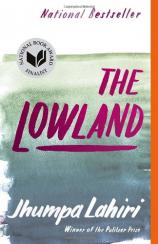Critical Praise
"Leave it to Jhumpa Lahiri to create yet another novel that’s as transporting and educational as it is beautiful and emotive . . . .The Lowland is among the biggest events of the season and the largest launch of her career."
"Pulitzer Prize-winner Lahiri’s unparalleled ability to transform the smallest moments into whole lives pinnacles in this extraordinary story of two brothers coming of age in the political tumult of 1960s India. . . . Lahiri is remarkable, achieving multilayered meaning in a simple act . . . [This is] is deservedly one of this year’s most anticipated books. Banal words of praise simply won’t do justice; perhaps what is needed is a three-word directive: just read it."
"A classic story of family and ideology at odds, love and risk closely twined. . . . Lahiri’s subject has always been the complex roots of families, cut and transplanted, trailing thwarted dreams and former selves. . . . The Lowland, her most ambitious work to date, marks the author’s shift in perspective toward that of a parent, with all its heightened vulnerability. . . . As the stripped-down sentences accrue with a kind of geologic inevitability, Lahiri renders the undertow of grief and loss . . . Novels are often elegies for things that would otherwise be lost to time. Here, over the passing decades, a sacred marshland is sold to developers; a daughter loses a mother, then becomes one. An author, at the height of her artistry, spins the globe and comes full circle."
"I wait for Lahiri’s books as if they’re rare comets and hold them in my hands like my firstborn."
"A tale of two continents in an era of political tumult, rendered with devastating depth and clarity by the Pulitzer Prize-winning author. The narrative proceeds from the simplicity of a fairy tale into a complex novel of moral ambiguity and aftershocks, with revelations that continue through decades and generations until the very last page. . . . The story of two brothers in India who are exceptionally close to each other, and yet completely different, the novel spans more than four decades in the life of [their] family, shaped and shaken by the events that have brought them together and tear them apart. . . . Lahiri has earned renown for her short stories, [yet] this masterful novel deserves to attract an even wider readership."
"Haunting . . . A novel that crosses generations, oceans, and the chasms within families . . . Lahiri’s skill is reflected not only in her restrained and lyric prose, but also in her moving forward chronological time while simultaneously unfolding memory, which does not fade in spite of the years. A formidable and beautiful book."
"An absolute triumph. Lahiri uses a gorgeously rendered Calcutta landscape to profound effect. . . . As shocking complexities tragedies, and revelations multiply, Lahiri astutely examines the psychological nuances of conviction, guilt, grief, marriage, and parenthood, and delicately but firmly dissects the moral conundrums inherent in violent revolution. Renowned for her exquisite prose and penetrating insights, Lahiri attains new heights of artistry—flawless transparency, immersive intimacy with characters and place—in her spellbinding fourth book and second novel. A magnificent, universal, and indelible work of literature. . . . Lahiri’s standing increases with each book, and this is her most compelling yet."
—








